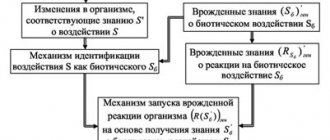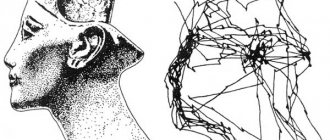Mental functions are certain properties and qualities of the psyche that ensure adaptation to changing environmental conditions. This is an integral system in which full interaction between the world and man is possible due to the interconnection and interdependence of all functions.
This definition of functions stems from an understanding of what the psyche serves and what it provides for human life. Thanks to the psyche, a person creates his own picture of reality based on the reflection of the surrounding world and can coordinate his activities and behavior.
The forms of such reflection can be different, and they are, of course, not unique to humans. What distinguishes a person from a dog or cat are the mechanisms of action of the psyche, which arose under the influence of the sociocultural development of society. The functions of the psyche underlie such complex and multi-valued mental processes and phenomena as memory, speech, imagination, thinking, perception, which themselves form consciousness. At the same time, there is also a lower level of the psyche, the level of the unconscious, which appears as a result of unconscious influences.
The world of the psyche is the inner spiritual world of a person. Subjective reality in which thoughts and feelings, emotions, interests, dreams and plans for the future, relationships with people and with oneself exist. Everything that makes a person different from anyone else, unique. The psyche is mobile and changeable, never stands still, and always develops due to the life experience gained.
The study of the psyche is not complete even today, and therefore there is no unified understanding of all functions. At the end of the 19th century, it was generally accepted that the psyche has only one function - adaptation, which allowed a person to survive in unfavorable environmental conditions. Of course, this explanation was not enough to justify such complex phenomena as creativity or love. Today in psychological literature, three functions of the psyche are identified and described, which are recognized as the most important. This is, first of all, a reflection of the surrounding reality. Then regulation of behavior. And in a general sense - awareness of one’s place in the world.
1. Reflection of the surrounding reality
The main ability of the psyche, manifested in the direct reflection of the environment. This is an active free process of constant and continuous cognition of reality, which is subjective in nature. This means that reflection depends on the individual personality characteristics of a person and even on a specific psycho-emotional state.
That is why people often fundamentally disagree in their opinions regarding similar objects or phenomena. Reflection allows you to build your own unique picture of the world, and each person has his own. At the same time, however, the subjectivity of perception does not deny the objectivity of the reality of the surrounding world, being, rather, a cast of reality.
Another feature of reflection was the ability to predict the course of events, as well as the result of one’s actions based on knowledge of the laws of the world and life experience.
2. Regulation of behavior
This feature allows you to react and respond to stimuli. Human behavior, moreover, is an external manifestation of the inner world. It depends on what motives and needs guide a person, in what ways he achieves his goals, what decisions and plans he makes for the future. Emotions in this case are a feedback channel showing how satisfied a person is with what surrounds him and what he does.
The main characteristic of this function is its arbitrariness. A person controls his behavior through volitional effort. This is very important because people live in society and are social beings. It would be impossible to build relationships with people without the ability to regulate one’s behavior through volitional effort.
3. Awareness of yourself and your place in the world
A person recognizes himself as an individual, with all the originality of character traits and individual characteristics of behavior. Understanding his difference from others, each person considers himself a part of society, thanks to which it is possible to build interpersonal relationships.
This function of the psyche largely makes it possible to ensure a person’s adaptation to the surrounding reality and the ability to navigate it. An important indicator, in this case, is adequacy in relation to oneself and to the world. An uncritical attitude distorts the picture of the world and interferes with building relationships.
Human behavior, as a social being, is particularly complex. And the processes of reflection and regulation depend on the active orientation. Therefore, active and reactive regulation and reflection are distinguished. A person, due to the presence of consciousness, is able not only to react passively to changes in environmental conditions, but to build his own conscious behavior.
There are other classifications that more fully or more briefly describe the functions of the psyche and their purpose. Here is an example of a detailed classification of mental functions.
Implicit functions and explicit functions of the psyche
Implicit functions (affective, gnostic, regulatory). These functions coordinate human interaction with the outside world. The basis of implicit functions is the nervous system and the brain, which are organs of mental activity. That is why these functions are considered to be specified from within.
Explicit functions (communicative, cognitive, emotive, conative, informational). They organize and manage a person’s interaction with other people, with himself and with the world of things. Their basis is the psyche and sense organs, and therefore they are considered given from the outside.
A few words about intelligence
Speech and intelligence can be distinguished as cognitive functions of the brain. After all, thanks to this, a person can pronounce meaningful sounds that develop into speech. The cognitive functions of the brain give an individual the opportunity to conduct a monologue even without a speech apparatus, only pronouncing words in his thoughts.
Using symbols that correspond to human sounds, written speech appears. And how rich a person’s vocabulary is and whether he can construct more complex phrases is related to his intelligence. One could even say that it is a person's unified cognitive ability, which relies on human functions such as attention, perception, memory and representation.
It was intelligence that separated humans and animals. However, intelligence itself is a general concept, the implementation of which requires a number of mental functions, such as: the ability to plan, predict various events, taking the environment and gained experience as a basis.
In order to determine a person’s intelligence, it is necessary to take into account such person’s abilities as: learning ability, logical thinking, the ability to analyze various information, as well as compare and find patterns in different phenomena.
And to characterize intelligence, the breadth and depth of thinking, logic, flexibility of mind, criticality and evidence of one’s conclusions are taken as a basis.
One of the important components of intelligence is erudition. Many people mistakenly assume that erudition and intelligence are the same thing, but this is far from true. Since an erudite merely has a large stock of knowledge, however, without intelligence, a person cannot use this “baggage” in any way, draw logical conclusions, and so on.
In order to measure intelligence today there are a number of tests. These tests are created based on a proven pattern, which says that if a person can solve a certain type of problem, then he will successfully cope with other tasks.
Gnostic functions
They ensure the receipt and assimilation of information about the properties of objects in the process of interaction between a person and the outside world.
Information received from the outside is processed in internal processes - memory, perception, imagination, sensations, representation and thinking. A person gets the opportunity to form his idea of the world, plan his actions and foresee the outcome of his actions.
Gnostic functions underlie cognitive activity. The result of their work is knowledge and intellectual potential.
LEADING ACTIVITY – GAME
So, play plays a major role in the mental development of preschool children. Going through certain age stages, it transforms depending on the degree of development of the baby:
- 3 – 4 years – director’s play;
- 4 – 5 years – the game becomes figurative and role-playing;
- 5 – 6 years – the game takes on a role-playing orientation;
- 6 - 7 years old - preschoolers play according to the rules established for each game.
Each game, to one degree or another, reflects some area of activity, as well as relationships. The game gradually ceases to be manipulative - using only objects. Its essence is transferred to a person, to his activities. Therefore, the child perceives the actions of adults as not only an objective, but also a subjective example.
The game has enormous developmental and educational significance. During games, children learn to fully communicate with each other: share, negotiate, help, conflict. The game develops motivation and the needs of children. In role-playing games with complex plots and actions, preschoolers actively develop their creative imagination. The game helps the child improve voluntary memory, perception, thinking, and intellectual activity. All this contributes to its further development and becomes the basis for preparation for training.
Cognitive functions
Provide meaningfulness to human cognitive activity.
A person’s personal orientation sets a certain focus on imagination and thinking. And therefore it is the starting point in the development of intelligence.
Under the influence of interaction with the world, processes such as thinking, representation, and imagination are formed. In this way, an internal model of the world is created and a person can foresee the results of actions. Thanks to this, for example, it is possible to find mutual understanding in communicating with people.
FORMATION OF PERSONALITY
One of the important aspects in the psychology of preschool age is the process of development of a small personality: its emotions, motivation, self-awareness.
- Emotional sphere.
The period of preschool childhood is relatively stable and calm emotionally: there are practically no special outbursts or conflicts, with the exception of the crisis of 3 years, when the child just realizes himself as a small social person. The stable development of the emotional sphere is facilitated by the development of the child’s ideas. Representations allow him to switch from a specific situation, so the difficulties that arise do not seem so significant. However, the experiences themselves gradually become more complex, deeper, more diverse, and the range of experienced emotions increases. For example, empathy for others appears. The child learns to feel and understand not only his own self. All images in the child’s mind acquire an emotional coloring, all his activities (and this, first of all, play) are saturated with vivid emotions.
- Motivation.
The beginning of personality formation is associated with the formation of such an important personal mechanism as the subordination of motives. They have different significance for a preschooler. One can distinguish motives of self-esteem (competition, achieving success), motives associated with the formation of moral standards, etc. In the preschool years, the child’s individual motivational system begins to build, which will be of great importance for his future success.
- Self-awareness.
It is considered to be the main new formation of the period. The formation of self-awareness is facilitated by active personal and intellectual development. Self-esteem is formed in middle preschool age, initially from one’s own assessment (necessarily positive), and then from assessments of the behavior of others. What is typical: the baby learns to evaluate the actions, skills or behavior of other children first, and then his own.
At this stage, gender identification occurs. Children recognize themselves as representatives of the male or female gender - a girl or a boy, and learn the features of appearance, clothing, character, behavior, and social roles of different sexes. By the senior preschool period, the child begins to perceive himself in time: he remembers what he was like in the past, is aware of himself “here and now,” and can also imagine what he will be like in the future. The baby knows how to correctly express these ideas in speech.
Creative features
This is the creative potential of human activity.
With the help of the mechanisms of exteriorization and interiorization, the transformation of creative potential occurs. Into internal - interiorized - mental states and properties (memory, emotions, thinking) and into external - exteriorized - manifestations of a person’s capabilities in actions and behavior. This ensures such phenomena in communication as infection, imitation, suggestion, which appear under the influence of another person.
The result of the development of these functions is the self-actualization of the individual, the desire for self-improvement. A person becomes a creator. And he creates his own new reality that meets his needs, instead of adapting to the surrounding reality.
Finally
Mental reality exists in 2 planes: external, aimed at peace and coordination of life. And internal, turned inward - by self-awareness, reflection, the phenomenon of introspection. The human psyche develops all the time and this process is strictly individual, depending on conditions and lifestyle, on the education received, on the social environment. Consequently, conscious, purposeful activity influences the development of certain abilities. All this is possible due to the fact that the functions of the psyche are closely linked. This ensures the integrity of the psyche, its continuous development and self-regulation.
If you find an error, please select a piece of text and press Ctrl+Enter.
Forms of mental reflection
Mechanical, chemical and physical reflection are its elementary forms, and the main form of reflection is biological reflection, the specificity of which is that it is characteristic only of living organisms.
The biological form of reflection during the transition to the mental is accompanied by the following stages:
- perceptual, generally reflecting a complex of stimuli, and the elementary form of mental reflection is sensations;
- sensory stage, in which the subject reacts only to biologically significant stimuli;
- intellectual stage - during its manifestation, a reflection occurs not only of individual objects, but also of their functional relationships and connections, which is the highest form of mental reflection.
The intellectual stage is characterized by complex activities and complex forms of reflection of reality.
With the development of self-regulation, the essence of which is a person’s ability to maintain internal stability at a certain level, a person can change his perception, and even his feelings.
A person’s inability to manage his mental state goes through the following stages - situation, attention, assessment, response - the sequence begins with a real or imaginary situation that is emotionally relevant. A person’s attention is directed to the emotional situation, which is assessed and interpreted, and the emotional response is generated and leads to poorly coordinated changes in response systems - experimental, behavioral, physiological.
With developed willpower, a person is able to change a pattern of behavior, which may look like this:
- a person decides for himself which situation to choose, whether this situation is necessary in his life, for example, a meeting, concert, party;
- a conscious effort to change a situation, such as using humor when moving away from an unpleasant person or object;
- mindful deployment involves directing attention either toward or away from an emotional situation using distraction;
- cognitive changes are associated with modifying the situation, how to assess the situation in order to change its emotional meaning, for which distance, humor, revaluation, etc. are used;
- response modulation involves an attempt to directly influence response systems - experimental, physiological, behavioral using strategies such as suppression of emotions, sleep, physical exercise.
Regulatory
Consciousness adapts to influence and is responsible for the regulatory function of the mental process, forming within a person an urge to action or to display special behavior.
With its help, a person builds a hierarchy of movement in reality:
- determines his desires and motives at a given time;
- defines tasks;
- develops ways to achieve the goal.
The regulatory function provides a mindless response to external irritating elements. A little later, when it has established itself and firmly settled within the personality, a strong-willed quality will be developed that helps a person make decisions, being responsible for them.
Emotions play an important role; if the body reacted violently to an external stimulus and a person is satisfied with the result, then he will further formulate his needs and achieve what he wants.
Information
It is inextricably linked with communication. After all, only with the help of communication can one notify about an impending danger, describe a situation, an object, talk about planned goals and objectives.
All information is significant for the psyche. It is loaded with meaning and transmitted through communication channels directly to the brain center.
On this basis, various languages arose for transmitting information in interpersonal communication:
- Morse code;
- pictograms;
- hieroglyphs;
- pantomime;
- facial expressions;
- gestural symbolism;
- verbal languages.
Human imagination is limitless, and ingenuity is amazing. For example, this can be seen in children's games, which are filled with encrypted meaning, which has a positive effect on the still fragile psyche of children.
Information is transmitted through a “transmission-reception” message, being processed by such qualities as perception and sensation.
In the process of sensation, only the physical features of signs are transmitted, for example, phonetics. And with the help of perception, you can notice the reflection of the sign as a whole, a meaningfully important message for society.
This is the most necessary mental function of all, which is designed for long-term storage of remembering details in memory. It is transformed into a symbolic form, reducing the size of the incoming material, seemingly voluminous in size, to compact storage.
Psychophysiological qualities involved in the information function help the individual express a view of the world from his point of view. This happens through the unique traits inherent in each individual, transforming them, he makes the message accessible to society.
In interaction with others, each person is viewed from an object-personal perspective, where the object is the message itself, and the person is the visualization of the external appearance, transformed into a sign system.
Since ancient times, people have focused on their appearance. The standard of beauty depends on the characteristics of the society and ethnic group in which it develops. Some try to achieve a long neck and black teeth, because in their national society this means the well-being of the family. Others, on the contrary, flaunt dark skin and a white-toothed smile.
Everyone is individual in their psyche, but everyone has the same goal - to stand out from the crowd and interest society, to provide information about themselves.









